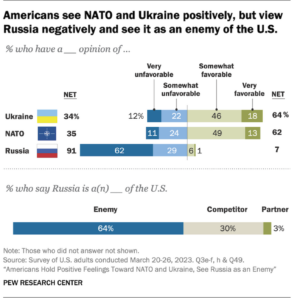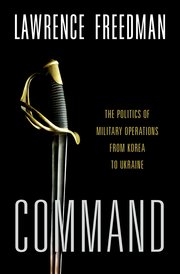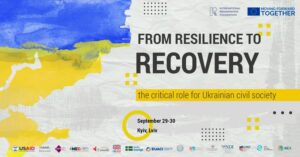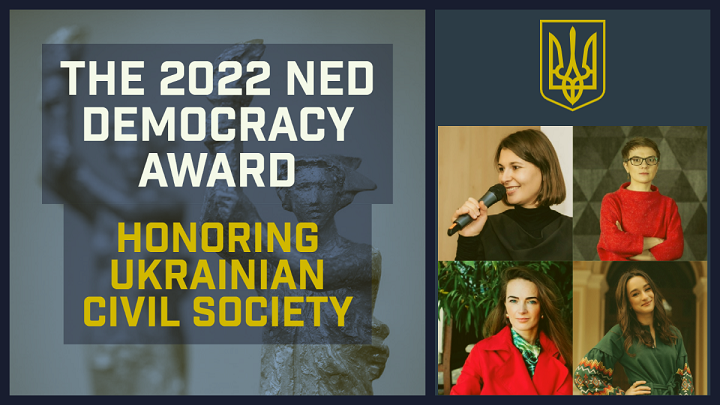 Although the coming Ukrainian offensive will do much to set expectations for the future trajectory of this war, the real challenge is thinking through what comes after, according to Michael Kofman, CNA Russia Studies Program Director, and Rob Lee, Senior Fellow in the Foreign Policy Research Institute’s Eurasia Program.
Although the coming Ukrainian offensive will do much to set expectations for the future trajectory of this war, the real challenge is thinking through what comes after, according to Michael Kofman, CNA Russia Studies Program Director, and Rob Lee, Senior Fellow in the Foreign Policy Research Institute’s Eurasia Program.
It is time, then, for the West to start planning more actively for the future, beyond the coming offensive, they write for Foreign Affairs:
History shows that wars are difficult to end and often go on well beyond the decisive phases of fighting, including as negotiations continue. For Ukraine and its Western backers, a working theory of victory must be premised on endurance, addressing Ukraine’s long-term force quality, capability, and sustainment needs. The United States and Europe must make the necessary investments to support the war effort well beyond 2023, develop plans for successive operations —and avoid pinning their hopes on any single offensive effort.
In contrast, Russian President Vladimir Putin has no goals or strategy for Ukraine, former Russian commander Igor Girkin told Newsweek. “The goals of the war are not defined, the understanding that ‘this war – until the complete victory of one of the parties’ – also did not arise among the inhabitants of the Planet of Pink Pony.”
 It is hard to see how there can be any basis for a full peace settlement for some time or confidence that any truce will be more than temporary as both sides prepare for the next round of fighting, says Lawrence Freedman, author of ‘Command: The Politics of Military Operations from Korea to Ukraine’. At the same time we should not take for granted what risks becoming a consensus expectation of a political stalemate almost irrespective of what happens on the ground, he writes:
It is hard to see how there can be any basis for a full peace settlement for some time or confidence that any truce will be more than temporary as both sides prepare for the next round of fighting, says Lawrence Freedman, author of ‘Command: The Politics of Military Operations from Korea to Ukraine’. At the same time we should not take for granted what risks becoming a consensus expectation of a political stalemate almost irrespective of what happens on the ground, he writes:
I would not assume that Putin can continue to brush off more significant setbacks, especially if the Russian position in Crimea starts to be threatened. To be sure, if the Ukrainian offensive fizzles without a breakthrough then the war might continue, even at a lower level of intensity, into next year. This is why the coming weeks and months are viewed in Kyiv with apprehension as well as hope. Either way Putin will still have achieved nothing by starting this war. If it is still underway this time next year, the next Victory Parade will be an even more forlorn spectacle.
However much land is taken, the main objective must be to convince the Russian elite of the futility of this war and the fragility of its occupation, Freedman writes for The Financial Times. The war began with a decision in the Kremlin and that is where a decision must be taken to end it.
 “A Brewing Crisis of Faith Threatens the Unthinkable in Putin’s War”, according to Anna Nemtsova, the daughter of Boris Nemtsov (right), who was murdered in February 2015.
“A Brewing Crisis of Faith Threatens the Unthinkable in Putin’s War”, according to Anna Nemtsova, the daughter of Boris Nemtsov (right), who was murdered in February 2015.
“Peremoga—or victory—has become the national toast of Ukraine, whether it’s raising a glass of vodka to it, praying for it, or wishing someone peremoga on their birthday,” she writes for The Daily Beast.
“For many Ukrainians, it’s also increasingly clear that the West does not share their taste for all-out victory. Avoiding a crushing defeat at the hands of Vladimir Putin’s Russia, yes, but Kyiv is growing frustrated that Europe and the U.S. are stopping short of helping them secure their cherished peremoga!”

Credit: NDI
Majorities of U.S. adults have favorable views of Ukraine, as well as the North Atlantic Treaty Organization, and have confidence in Ukraine’s leader, President Volodymyr Zelenskyy, the Pew Research Center reports. At the same time, few have positive opinions of Russia or confidence in its ruler, President Vladimir Putin. And a 64% majority view Russia as an enemy to the United States, rather than as a competitor or partner.
The U.S. is working to address the massive challenge of Russia’s “steady, relentless stream of disinformation about its war of aggression against Ukraine, to lie about and cover up horrific abuses it’s committed, to try to justify committing others,” Secretary of State Antony J. Blinken told last night’s Freedom House 2023 Annual Awards Ceremony.
“In response, the State Department has developed an AI-enabled online Ukraine Content Aggregator to collect verifiable Russian disinformation and then to share that with partners around the world,” he said. Blinken also paid tribute to Russian journalist Vladimir Kara-Murza, sentenced to 25 years for criticizing the war in Ukraine, as well as “a lifetime of courageous work to seek a better future for his fellow Russian citizens.”

“The West does not have a plan for Russia’s defeat,” says Daria Kaleniuk (above, top left), who leads the International Center for Ukraine’s Victory. “Their fear causes the death of our children.”
“The frustration with the West’s pessimism about defeating Russia—coupled with delays in military aid—is shared by many public officials, military, leaders, and ordinary people in Ukraine, where 97 percent of the population believe their country has a real shot at winning,” adds Kaleniuk, whose Anti-Corruption Action Center was a recipient of the 2022 Democracy Award from the National Endowment for Democracy (NED).
DON’T MISS! @fpa1918 & @NEDemocracy honor @OMarkarova, Ambassador Extraordinary & Plenipotentiary of Ukraine to the US at #NewYorkDemocracyForum Dinner 2023. June 29th at St. Regis Hotel (2 West 55th Street) 6:30 PM to 9:30 PM. https://t.co/Vh6uBPTs2s @Eventbrite
— Democracy Digest (@demdigest) May 11, 2023
Charles Kupchan, senior fellow at the Council on Foreign Relations and a professor of international affairs at Georgetown University, sits down with James M. Lindsay to discuss the status of the war in Ukraine and whether it is time for the West to rethink their strategy.
Putin has no goal or strategy in Ukraine, former Russian commander warns https://t.co/Xp6ViiefoN
— Democracy Digest (@demdigest) May 10, 2023







